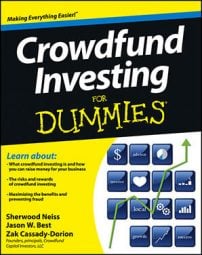As a crowdfund investor, you must hold your company stock for a minimum of one year. (If you hold a company’s debt instead, you may or may not be subject to the same holding period.) The SEC doesn’t want you (or anyone else) buying a stock in a company and then immediately trying to inflate its worth.
For example, say that you buy equity in a company via a crowdfund investing campaign. As soon as the campaign closes, you go onto your social networks and write a message like this: “ I just bought a piece of the next Facebook. No more shares are available, but I’m willing to share some of mine at the right price.” (Of course, the “right price” is going to be twice what you paid for the shares, or more.)
If you and other crowdfund investors acted in this way, the whole crowdfund investment opportunity would sink. Potential investors would be looking to get rich quick instead of investing in companies they really believe in. The entire process would get a bad reputation, and entrepreneurs and small business owners with solid business plans in plain-Jane industries would watch their funding opportunities dry up.
Requiring crowdfund investors to hold on to their stocks for a year creates more transparency in the marketplace, and transparency is a great thing. After the year period is up, if an initial investor decides to sell her stock, other potential investors will be able to evaluate whether the company in question is really worth the price she paid for the stock — or more, or less.
Twelve months’ worth of information about the company (including an annual report that the company files with the Securities and Exchange Commission [SEC] and sends out to its investors) will be available for review, and anyone willing to do his homework should be able to avoid getting duped.
Need more convincing that the one-year holding period is valuable? Consider this: The majority of the trading that takes place in the public markets is short term. This rapid buying and selling of securities creates uncertainty in the value of any stock. (Why are so many people selling it? Why are so many people buying it?)
This uncertainty is otherwise known as volatility. The more volatility that exists, the more the price of a stock will move — both up and down. Volatility makes the owners of a business react to the movement of the stock, which isn’t always the right thing to do and isn’t always in the best interest of the shareholders.
Holding on to a stock for a minimum of a year decreases the stock’s volatility, thus allowing entrepreneurs and business owners to focus on what they should be doing: running a business.

